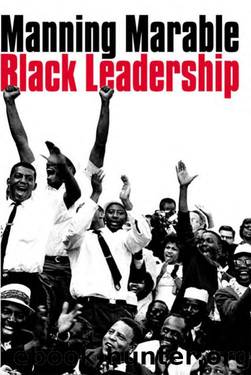Black Leadership by Marable Manning

Author:Marable, Manning [Marable, Manning]
Language: eng
Format: epub, azw3, mobi
Tags: Political Science, Political Process, Columbia University Press, General, African American Studies, Ethnic Studies, Social Science
ISBN: 9780231107464
Google: 5GPYngEACAAJ
Publisher: Columbia University Press
Published: 1998-01-15T14:41:42.899681+00:00
9
Harold Washingtonâs Chicago:
Race, Class Conflict, and Political Change In 1983 Chicago elected its first black mayor, Congressman Harold Washington, in a political contest highly charged with racism and social-class conflict. Breaking out of a two-generations-long pattern of electoral apathy and political repression, nearly three-fourths of all black voters turned out on April 12 of that year to give Washington more than 514,000
votes. The black Democrat combined that total with votes from other key constituenciesâ79 percent of the Puerto Rican vote, 68 percent of the Mexican American vote, and 38 percent of the Jewish voteâto defeat Bernard Epton, his previously obscure Republican opponent.1 During the next four years Washington tried to reform the cityâs byzantine government while addressing the basic grievances and problems of blacks and other constituents in the areas of housing, health care, employment, police brutality, and social services.
The central political dilemma confronting Washington was the need to create a broad-based, progressive, radical-reformist, multiethnic, multiclass coalition that would, in theory, embrace African Americans, Hispanics, Asian Americans, low-income working people, and the unemployed. Evidence provided by the mayoral campaign of 1987, when Mayor Washington sought and won reelection, suggests that the difficulties inherent in such a strategyâa âRainbow Coalitionââmay be underestimated by its proponents. Moreover, the coalitionâs more progressive elements failed to develop independent structures outside of government to influence the mayorâs 127
128 | Harold Washingtonâs Chicago agenda, and that failure directly contributed to the difficulty of consolidating a Rainbow Coalition in Chicago.
I
Washingtonâs inability to dominate the city council for the first three years of his tenure undermined his efforts to transform Chicagoâs political system. The boss of the Cook County Democratic Party machine, Alderman E. R. âFast Eddieâ Vrdolyak, deprived the mayor of any real authority by controlling twenty-nine of the fifty aldermen. Vrdolyakâs majority bloc changed the city councilâs rules to require a two-thirds vote to take bills away from committees that refused to act on them. âRegularâ Democrats dominated by the machine held the powerful committee chairmanships, and independents aligned with Washington held nothing. Normal governmental processes were totally disrupted by these âcouncil wars.â
Superficially, the conflicts between the Vrdolyak and Washington blocs seemed to be motivated solely by race. During the 1983 Democratic mayoral primary, Vrdolyak had mobilized white supporters by resorting to crude race-baiting: âItâs a racial thing. Donât kid yourself. . . . Weâre fighting to keep the city the way it is.â2 The fundamental factors motivating these political skirmishes, however, were patronage and power, not race. Vrdolyak and his allies were âconcerned about loss of power and patronage and opportunities,â observed Edwin C. Berry, former director of the Chicago Urban League. âIf Harold Washington were as white as the driven snow and he took away those privileges, they would be equally against him.â3
Despite the disruption caused by the council wars, Washingtonâs administration successfully addressed many social problems. In the area of public housing, the city built 9,596 new residential units in 1983â1985.
Washingtonâs housing staff was reduced by one-fourth, but it was able to rehabilitate more than twice the number of homes restored under the previous administration.
Download
Black Leadership by Marable Manning.azw3
Black Leadership by Marable Manning.mobi
This site does not store any files on its server. We only index and link to content provided by other sites. Please contact the content providers to delete copyright contents if any and email us, we'll remove relevant links or contents immediately.
The Secret History by Donna Tartt(19010)
The Social Justice Warrior Handbook by Lisa De Pasquale(12179)
Thirteen Reasons Why by Jay Asher(8878)
This Is How You Lose Her by Junot Diaz(6865)
Weapons of Math Destruction by Cathy O'Neil(6253)
Zero to One by Peter Thiel(5776)
Beartown by Fredrik Backman(5722)
The Myth of the Strong Leader by Archie Brown(5485)
The Fire Next Time by James Baldwin(5418)
How Democracies Die by Steven Levitsky & Daniel Ziblatt(5207)
Promise Me, Dad by Joe Biden(5135)
Stone's Rules by Roger Stone(5070)
A Higher Loyalty: Truth, Lies, and Leadership by James Comey(4942)
100 Deadly Skills by Clint Emerson(4902)
Rise and Kill First by Ronen Bergman(4766)
Secrecy World by Jake Bernstein(4733)
The David Icke Guide to the Global Conspiracy (and how to end it) by David Icke(4691)
The Farm by Tom Rob Smith(4494)
The Doomsday Machine by Daniel Ellsberg(4477)
